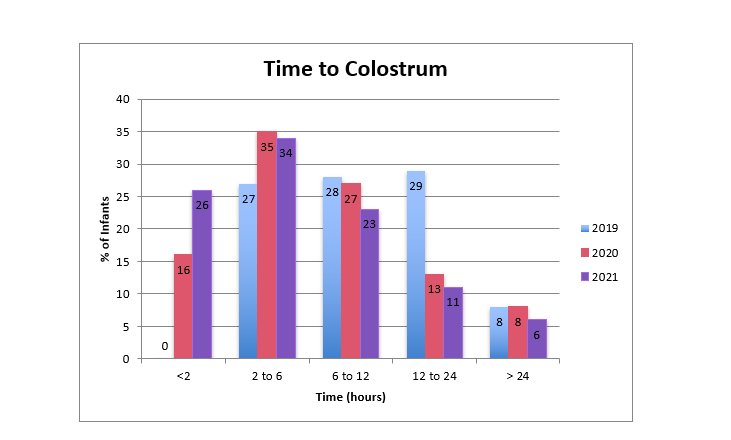Breastfeeding/Human Milk
Category: Abstract Submission
Breastfeeding/Human Milk II
430 - Impact of dedicated NICU lactation specialist in VLBW infants
Sunday, April 24, 2022
3:30 PM - 6:00 PM US MT
Poster Number: 430
Publication Number: 430.302
Publication Number: 430.302
Meredith Y. Kinoshita, Royal College of Surgeons Ireland, Dublin 6W, Dublin, Ireland; Iby Chacko, Coombe Women and Infants University Hospital,Ireland, Dublin 15, Dublin, Ireland; Lisa Conboy, Coombe hospital, Dublin, Dublin, Ireland; Anne O'Sullivan, Coombe Woman and Infants University Hospital, Dublin, Dublin, Ireland; Martin J. White, RCSI, Dublin, Dublin, Ireland; Anne Doolan, Coombe Women and Infants Hospital, Dublin 8, Dublin, Ireland
- MK
Meredith Kinoshita, BMedSc, MB, BCh, BAO (Hons) (she/her/hers)
Specialist Registrar
The Coombe Hospital
Dublin, Dublin, Ireland
Presenting Author(s)
Background: Early initiation of breastmilk expression increases milk production in mothers of very low birth weight (VLBW) infants. Audit of practice in our NICU in 2019 demonstrated that no VLBW infants received colostrum within the target time of 2 hours post delivery and only 27% of infants received colostrum by 6 hours of life. To address the unique breastfeeding challenges in preterm infants, a dedicated international board certified lactation consultant (IBCLC) for NICU was introduced in late 2019.
Objective: The aim was to assess the impact of a dedicated IBCLC on early availability of colostrum and provision of maternal breastmilk in infants born ≤1500g. Objectives were to measure time to support with hand expression, time to colostrum availability, and feeding substrate at discharge.
Design/Methods: A retrospective chart review was conducted over two six-month periods: 1) Jan-June, 2020 after introduction of half time IBCLC support and 2) Jan-June, 2021 with full time equivalent. NICU IBCLCs provided lactation support during and post hospital stay and provided education for other healthcare professionals. The study population included infants born ≤1500g. Those with contraindication to enteral feeding, whose mothers had an absolute contraindication to breastfeeding or who were outborn were excluded. Data was compared to a pre intervention cohort (Jan-June 2019).
Results: Demographic details remained similar across all 3 years (Table 1). Prior to dedicated IBCLC support, no mothers of VLBW infants received assistance with hand expression within 2 hours of delivery and 47% of mothers did not receive help for more than 12 hours. Following intervention, 21% received assistance with hand expressing within 2 hours of delivery increasing to 40% in 2021. Availability of colostrum improved over the study period (Figure 1) with a significant association between IBCLC support and availability of colostrum before 6 hours of life (p < 0.05). Post intervention, 16.7% and 25.7% of infants received colostrum within 2 hours, with 54% and 67% received colostrum within 6 hours of birth. A sustained increase in infants receiving maternal breastmilk at discharge was achieved (75% in 2020 and 2021) with 52.5% and 51% receiving breastmilk exclusively (Figure 2). Conclusion(s): Delay in timing of first milk expression post birth impacts later maternal milk supply. Specialized lactation support led to earlier and increased availability of maternal breastmilk and improved breastfeeding rates in VLBW infants. Next steps include improving direct feeding at the breast as opposed to feeding breastmilk by bottle in this high risk cohort.
Table 1. Demographic data for infants < 1500g born between Jan-June in 2019, 2020, and 2021..png)
Figure 1. Time to VLBW infants receiving colostrum for oral care or feed over 3 years, before and after dedicated IBCLC support
Objective: The aim was to assess the impact of a dedicated IBCLC on early availability of colostrum and provision of maternal breastmilk in infants born ≤1500g. Objectives were to measure time to support with hand expression, time to colostrum availability, and feeding substrate at discharge.
Design/Methods: A retrospective chart review was conducted over two six-month periods: 1) Jan-June, 2020 after introduction of half time IBCLC support and 2) Jan-June, 2021 with full time equivalent. NICU IBCLCs provided lactation support during and post hospital stay and provided education for other healthcare professionals. The study population included infants born ≤1500g. Those with contraindication to enteral feeding, whose mothers had an absolute contraindication to breastfeeding or who were outborn were excluded. Data was compared to a pre intervention cohort (Jan-June 2019).
Results: Demographic details remained similar across all 3 years (Table 1). Prior to dedicated IBCLC support, no mothers of VLBW infants received assistance with hand expression within 2 hours of delivery and 47% of mothers did not receive help for more than 12 hours. Following intervention, 21% received assistance with hand expressing within 2 hours of delivery increasing to 40% in 2021. Availability of colostrum improved over the study period (Figure 1) with a significant association between IBCLC support and availability of colostrum before 6 hours of life (p < 0.05). Post intervention, 16.7% and 25.7% of infants received colostrum within 2 hours, with 54% and 67% received colostrum within 6 hours of birth. A sustained increase in infants receiving maternal breastmilk at discharge was achieved (75% in 2020 and 2021) with 52.5% and 51% receiving breastmilk exclusively (Figure 2). Conclusion(s): Delay in timing of first milk expression post birth impacts later maternal milk supply. Specialized lactation support led to earlier and increased availability of maternal breastmilk and improved breastfeeding rates in VLBW infants. Next steps include improving direct feeding at the breast as opposed to feeding breastmilk by bottle in this high risk cohort.
Table 1. Demographic data for infants < 1500g born between Jan-June in 2019, 2020, and 2021.
.png)
Figure 1. Time to VLBW infants receiving colostrum for oral care or feed over 3 years, before and after dedicated IBCLC support

